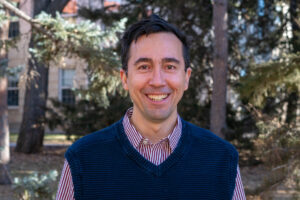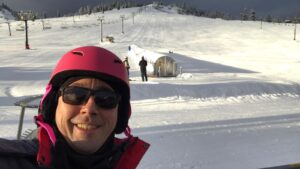
Dr. Eduardo Gallo Cajiao is a new Assistant Professor at Colorado State University in the Department of Human Dimensions of Natural Resources. He comes to Fort Collins and CSU by way of the University of Washington in Seattle. His research gravitates towards understanding the governance dimensions of migratory species conservation at various scales, with a particular focus on emergence, effectiveness, agency, social-ecological fit, implementation, dynamics, and institutional complexity. He obtained a biology degree from Universidad del Valle in his home country of Colombia, before continuing his education in Australia. He completed his Master’s in Environmental Science at Macquarie University and later his PhD in Conservation Biology and Environmental Governance at The University of Queensland. Like a natural fit into Fort Collins, he is already riding his bike to work during the winter.
Q: What brought you to HDNR and CSU?
A: I came to HDNR and CSU for the possibility of contributing to biodiversity conservation through scholarship, capacity building of the next generations, and service to the community. I am very fortunate to have joined HDNR as it is an amazing place where I can advance environmental governance research and practice within the context of environmental social science. Furthermore, there are so many great opportunities to work across disciplines spanning the various departments of the Warner College of Natural Resources. Last but not least, I love the mission of CSU as a land grant university deeply rooted in community and with a problem-solving orientation to advance societal goals in Colorado and beyond.
Q: What are your research and teaching interests and how did you get interested in those topics?
A: My main research and teaching areas fall under the realm of environmental governance. That’s to say, basically, I focus on how humans get together for coordinating and collaborating in relation to the use, management, and conservation of natural resources. In particular, I dedicate most of my efforts to environmental governance as it pertains to biodiversity conservation with a particular interest in birds. My research is centered around understanding the governance dimensions for conserving migratory birds, but I am eager to expand my work to other migratory animals, such as insects, fish, turtles, and ungulates. Indeed, I am very pumped with the possibility of working on pronghorn, mule deer, and elk migration. Because bird migration oftentimes involves large spatial scales across various countries, my governance research has an important international component, which has focused on the Asia-Pacific and the Americas so far. The main questions I am interested in are how and why governance arrangements emerge, how they perform, and how they change over time. My research program strives to contribute as much to scholarship as to practice, so I work closely with NGOs, national governments, and inter-governmental organizations. My teaching naturally follows my interest in governance, so I use my own research as a pedagogic platform and in turn I use teaching as a space to further understand governance more broadly and identify research opportunities.
I became interested in environmental governance after a few years working on conservation in Colombia and Australia, particularly after being field crew at a bird observatory in northwestern Australia where I handled birds that had travelled all the way from Russia. Basically, through my work experience I realized that governance is ultimately the overarching political and social structure through which conservation action takes place, so understanding it is central to find ways for change. Additionally, the very interdisciplinary nature of environmental governance has been a big draw for me as it is intellectually stimulating as well as rewarding because of its potential for being impactful in real-world problems.
Q: What classes are you slated to teach?
A: This semester I am having a blast teaching Environmental Governance (NRRT 400). I am slated to teach Environmental Governance (NR 541) and Environmental Conflict Management (NRRT 262) in the Fall.
Q: What is your teaching philosophy?
A: My teaching is centered on providing students with solid conceptual and theoretical tools to understand real-world cases of environmental problems where they can potentially make a difference once they join the workforce. Hence, my classes go back and forth between theory, concepts, and empirical cases, so students can develop strong analytical and critical thinking skills for problem solving straddling environmental and social issues. As part of this process, I use deliberate scaffolding, as well as reinforcement to ensure students incorporate course content thoroughly. My courses blend various pedagogic approaches including standard lecturing, simulations, and group discussions.
Q: How has the adjustment from Seattle to Fort Collins been?
A: Coming from Seattle to Fort Collins has been pretty smooth and easy, particularly because I have now realized that winters can be cold but sunny. I love Fort Collins, especially the community feeling, short commute, and the many interesting and exciting activities available in and around town.
Q: What do you do for fun outside of your career?
A: These days I enjoy trying to learn how to play acoustic guitar, as well as further my cooking skills across various cuisines. For sports, I love skiing and mountain biking, for which I know I still have a long way to be up to Colorado’s standards.
